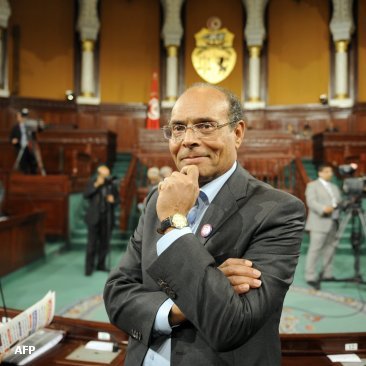Tunisia swears in opposition stalwart Marzouki as president
Kaouther Larbi
TUNIS, Kaouther Larbi- Almost a year since the Arab Spring started in Tunisia, the north African nation on Tuesday swore in veteran opposition rights activist Moncef Marzouki as its first elected president.
The 66-year-old French trained doctor, who was forced into exile for a decade by former strongman Zine el Abidine Ben Ali, had tears in his eyes when he solemnly promised to be the "president of all Tunisians".

"I will be the guarantor of the national interests, the state of laws and institutions," he said with his hand on the Koran as he took his oath before the constituent assembly that had elected him on Tuesday.
His first task will be to name Hamadi Jebali -- the number two of the moderate Islamist Ennahda party which won October elections -- as prime minister of a new government to be unveiled on Wednesday, he told reporters.
Most ministerial posts are expected to go to Ennahda, according to political sources, while its allies from the centre-left Congress for the Republic party and some independents are also expected to take several portfolios.
Marzouki moved into Ben Ali's old seaside palace, beside the Roman ruins at Carthage, almost a year since the self-immolation of a Tunisian street vendor started a protest movement that spread across much of the Arab world.
"I will be faithful to the martyrs and to the objectives of the revolution," the new leader said. "Without their sacrifice, I would not be here," he added, calling on people to also "pray for the people of Syria and Yemen".
The new Tunisian leader said "other nations are watching us as a laboratory of democracy. The main challenge is to attain the revolution's goals."
"Our mission is to promote our Arab-Muslim identity and be open to the world; to protect the veiled (women) and girls in niqab as well as those who aren't veiled," he said, promising to safeguard health, education and women's rights.
Calling for national reconciliation, he urged the opposition "to participate in the nation's political life and not confine itself to a role of observer".
Before taking up residence in the palace, Marzouki held talks with the outgoing president Fouad Mebazaa, who was appointed interim president after Ben Ali's January 14 ouster at the beginning of a tumultuous year for Tunisia.
The north African country's new president was Ben Ali's bete noire throughout his political career and was forced to live in exile in France for a decade.
Critics accuse Marzouki of being a pawn of Ennahda, which came in first in the October 23 constituent assembly elections with 89 seats.
Marzouki's Congress for the Republic Party -- whose symbol is a pair of red glasses inspired by his outsize spectacles -- was second, winning 29 seats.
On Monday Marzouki was elected with 153 votes in the 217-member constituent assembly, with three of the 202 deputies present voting against, two abstaining and 44 opposition members casting blank ballots.
Marzouki, who headed the Tunisian League for the Defence of Human Rights (LTDH) from 1989 until Ben Ali supporters forced him out in 1994, has a deep-seated passion for human rights.
An admirer of India's independence hero Mahatma Gandhi, he travelled to that country, as well as South Africa after the end of apartheid.
Marzouki, a father of three, is divorced from his French wife. A prolific writer, he has penned several books in French and Arabic including one titled "Dictators on Watch: A Democratic Path for the Arab World."
-----------------------------------------------------------------------------------